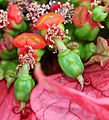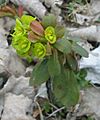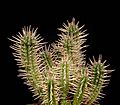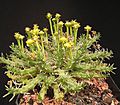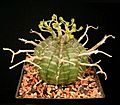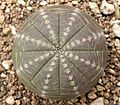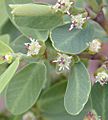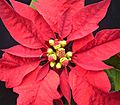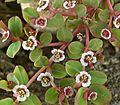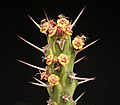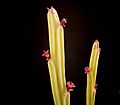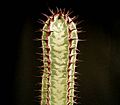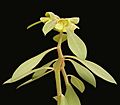Euphorbia facts for kids
Quick facts for kids Euphorbia |
|
|---|---|
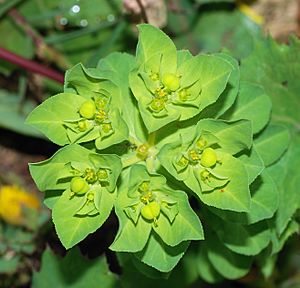 |
|
| Euphorbia cf. serrata | |
| Scientific classification | |
| Kingdom: | |
| (unranked): | |
| (unranked): | |
| (unranked): | |
| Order: | |
| Family: | |
| Subtribe: |
Euphorbiinae
|
| Genus: |
Euphorbia
|
Euphorbia is a huge group of plants with more than 2,000 different species. It's one of the biggest plant groups in the entire plant kingdom! You might know some of these plants by common names like poinsettia, spurge, or just Euphorbia.
Contents
About Euphorbia Plants
Many Euphorbia plants have special ways to protect themselves. They can be poisonous if someone eats them. This is a natural defense to stop animals from munching on them. So, it's super important not to eat any part of these plants!
The Euphorbia family belongs to a large group of plants called Malpighiales. This group is one of the biggest in the plant world. Other plants in the wider Euphorbia family include crotons (like Codiaeum), castor bean plants (Ricinus), and hogworts (Croton).
What Makes Them Special?
Many Euphorbia plants are known for not needing a lot of water. They are a bit like cacti in that way. This means they can often grow well in dry places.
One of the most famous Euphorbia plants is the poinsettia. People often call poinsettias "Christmas flowers" because they are very popular during the holiday season.
Different Kinds of Euphorbia
There are many smaller groups of plants within the big Euphorbia genus. For example, the castor bean plant (Ricinus) is part of this family. It's a very toxic plant, which means it contains strong natural chemicals that can be harmful. Always remember to never touch or eat parts of unknown plants.
Images for kids
-
Euphorbia false-flower
-
Painted euphorbia Euphorbia heterophylla
-
Poinsettia Euphorbia pulcherrima
See also
 In Spanish: Euphorbia para niños
In Spanish: Euphorbia para niños
 | Emma Amos |
 | Edward Mitchell Bannister |
 | Larry D. Alexander |
 | Ernie Barnes |




